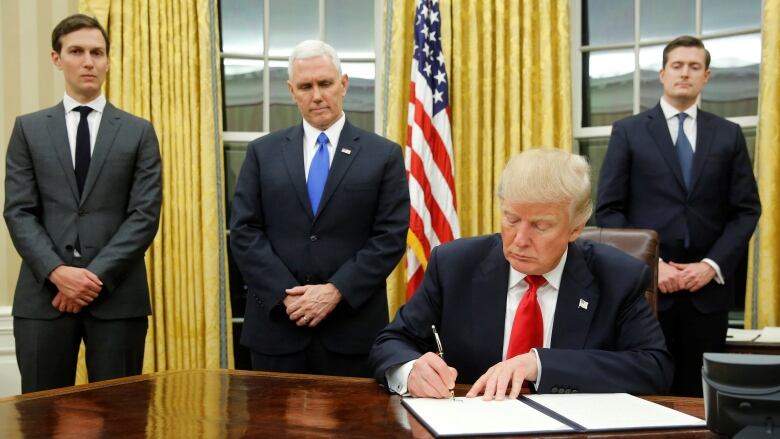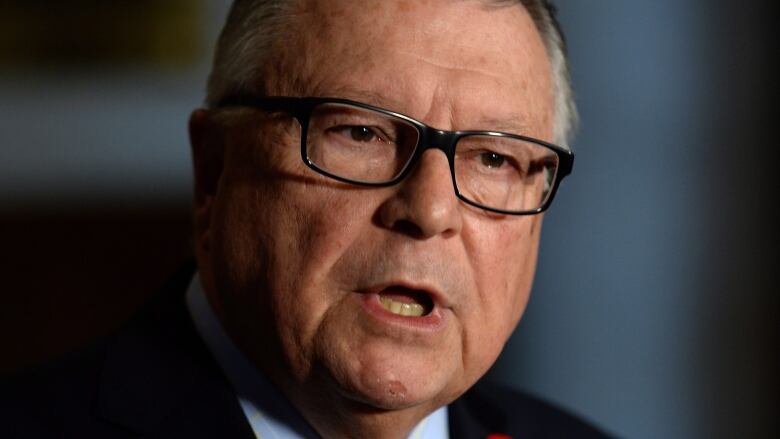With Trump in the White House, Canada needs better intelligence on the U.S.
This isnt a call for spying in the clandestine sense, but for greater analysis of existing intelligence

The first tumultuous weeks of policy decisions from the Trump administration has upset Ottawa's carefully laid plans for engaging with the U.S.
The Canadian government's initial strategy for engaging with President Donald Trump involved high-level networking lots of talking to try to shield us, where possible, from the new administration's isolationist, security-driven impulses.
Yet on its own, the soft power "charm" offensive is unlikely to be a winning strategy.Indeed, plans for an early visit by President Trump to Ottawa have already been shelved.
Shuffling the strategy deck
The Canadian government will have to come up with something new. Among other things, Public Safety Minister Ralph Goodale will have to shuffle the strategy deck for future talks with his American counterparts on border security issues. No one at the senior level will want to experience a repeat of the Australian prime minister's testy and short-lived conversation with the president, who, according to media reports, hung up the phone on a key and long-standing U.S. ally in the Pacific.
Part of the equation has to be networking like crazy with Trump's inner circle and other influential actors in Washington. But the effectiveness of any future networking now lies in our ability to get deeper into the mind of this new administration, to understand the players and policy drivers and to look for ways to predict future policy developments before they are sprung on us.
A key to this enterprise will be good intelligence on the U.S.This isn't a call for spying in the clandestine sense; Canada hasn't spied on the U.S. in any serious way since the 1860s and isn't about to start now.
What Canada does need to do is to draw on our existing intelligence system, not to prise out U.S. secrets, but to assemble the best possible analytical picture of developments happening in the U.S. We need a full exploitation of open sources, diplomatic reporting, messaging from high-level contacts friendly and otherwise and expert views. This analytical effort needs to be at the heart of our networking strategy, to ensure that we are calibrating our Canadian messages for maximum effect mindful of the president and his inner circle of political appointees such as Chief Strategist Steve Bannon, and son-in-law and senior political advisor Jared Kushner.
Getting ahead of Trump
We also need to try to use intelligence analysis to get ahead of the Trump administration. Only in that way will we be able to decide on which issues of national interest and values we should stand our ground, and where we might entertain some flexibility.Canada can't engage in a new high-stakes relationship with the U.S. on a reactive basis, supported by comfortable assumptions of continuity and stability. Prediction is inherently hard for intelligence systems and predictions on Trump and his team will be especially hard given Trump's personal erraticness but efforts to try to figure out where its policies and ideas might be heading will be essential.
That said, Canada will face some real challenges in making this happen, partly because an effort like this has virtually no precedent. In the past, we had always assumed that U.S. politics and policies were more or less an open book; the U.S. was, after all, our closest friend and security partner. But all of that can no longer be taken for granted.

A second problem is that any stream of analytic reporting on the U.S. would have to be of high quality and very timely if it going to engage the most senior readers in Ottawa, from the prime minister down. Busy decision-makers need a reason to read intelligence reports, and the product has to deliver real insights or the exercise will be a waste of everyone's time and scarce intelligence community resources. In effect, it would have to be the Canadian equivalent of the President's Daily Brief (apparently no longer read by the new president) or the UK Joint Intelligence Committee "Red Book."
A third problem is that any high-level Canadian intelligence analysis on the U.S. would have to be locked down to ensure that it was not leaked. It would have to be treated as wholly independent, untouched by political pressure or massaging.
Reorienting the system
Finally, any such dedicated analytic effort would require new resources. Historically, intelligence analysis has been the orphan of the intelligence system, underfunded and arguably lacking in respect when compared to the traditional business lines of collecting secret intelligence. The Canadian intelligence system would have to reorient itself, and the Canadian government would have to pay.
A Canadian version of "spying" on the U.S. in troubled times might be called a modest proposal, in the best tradition of Jonathan Swift. But old strategies simply won't work in a new era of the Trump administration. Networking will be essential but not enough. Canadian intelligence must be two steps ahead.
This column is part of CBC'sOpinion section.For more information about this section, please read thiseditor'sblogandourFAQ.












_(720p).jpg)


 OFFICIAL HD MUSIC VIDEO.jpg)
.jpg)



























































































